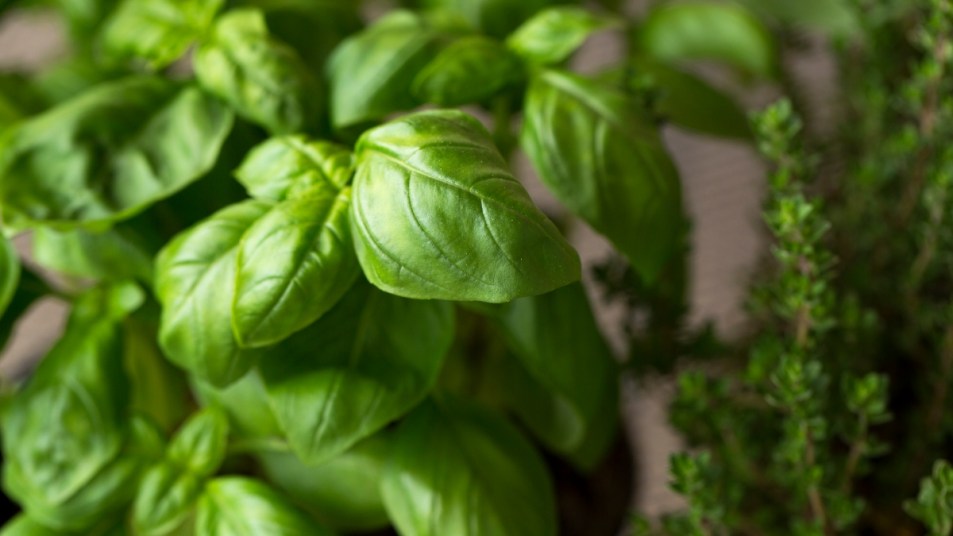This Popular Herb May Help Reduce Your Risk of Alzheimer’s Disease

The next time you pick some fresh basil from your garden, remember that it’s great for your brain health! New research shows that fenchol, a natural compound in basil and other plants, may protect the brain against Alzheimer’s disease.
Behind the Herb
Fenchol is a type of terpene, or a naturally occurring compound that gives the plant its signature scent. It’s the reason basil smells so heavenly. It’s also the reason basil and plants containing terpenes have antibacterial, antimicrobial, and antioxidant properties.
But why might fenchol reduce the risk of Alzheimer’s disease? In the study published in Frontiers in Aging Neuroscience, researchers wanted to better understand the link between the gut microbiome and the brain. They knew from previous studies that the microorganisms living in our digestive tract play a huge role in our metabolism, endocrine system, and immunity. They also knew that those microorganisms release chemicals that improve brain health.
But could chemicals from outside the body improve brain health as well? With this question in mind, the research team theorized that fenchol protects the brain against Alzheimer’s disease.
Understanding Fenchol’s Effect on Gut Health and the Brain
Multiple neurochemical pathways link the gut to the brain. This means that the brain and the gut are constantly communicating. But how? According to a 2020 review published in Frontiers in Endocrinology, researchers believe that short-chain fatty acids play a big role. Short-chain fatty acids, or SCFAs, are a type of fatty acid in the digestive tract. Microorganisms in the gut produce them as they ferment certain foods, specifically dietary fibers and resistant starch. (Resistant starch is a carbohydrate in grains, seeds, and legumes that resists digestion in the small intestine. It ferments in the large intestine instead.)
SCFAs travel through the blood to the brain. Once there, they activate a sensing mechanism on brain cells. As the Frontiers in Aging Neuroscience study discovered, this activation causes the brain to start clearing out any abnormal buildup of Aβ protein. The Aβ protein is the main ingredient in “bad” brain plaque, which builds up in the brains of Alzheimer’s patients.
What does all this have to do with fenchol? The researchers noticed that when they blocked the SCFA sensing mechanism, the brain developed an abnormal buildup of Aβ protein. So, they set out to find a plant compound that could unblock the sensing mechanism.
Fenchol was the plant compound for the job. Of all the compounds that the researchers tested, it was the best at binding to the sensing mechanism. Even better, it significantly lowered the amount of Aβ protein in the brain. It also reduced the death of neurons.
Fenchol did something else extraordinary, too. Upon closer examination, researchers found that the plant compound decreased senescent neuronal cells, or cells that stop multiplying but don’t die off. So, they continue to release chemicals that trigger inflammation. The inflammation can spread and damage neighboring cells. For this reason, scientists refer to them as “zombie” cells. Alzheimer’s patients often have these zombie cells in their brains.
What does this mean for you?
As with any scientific study, we should take the findings with a few grains of salt. The authors said they don’t know yet whether fresh basil on its own would be as effective. They also have yet to determine the exact dose of fenchol that would benefit the brain the most. And what about other plants that contain fenchol? Hemp, lime, nutmeg, wild celery, and cannabis all contain fenchol as well.
Still, we can all agree that the research is promising and that basil is delicious. Eating more of this yummy green can’t hurt! In addition to fenchol, basil is rich in vitamin K, manganese, iron, and calcium. Thus, whether you serve it with sliced mozzarella and tomato or blend it into a creamy pesto, this tasty treat is bound to enrich your diet.
















